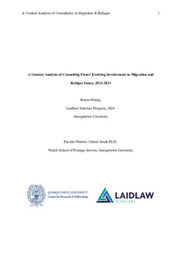Outline: Examining the Emergent Influence of Consulting Firms on Refugee Incorporation and Forced Migration, 2012-2023
Title: Examining the Emergent Influence of Consulting Firms on Refugee Incorporation and Forced Migration, 2013-2023
Abstract:
Powerful consulting firms are increasingly engaged by state-level actors to advise on migration and refugee flows. This connection between humanitarian and state-level actors and private, international consulting firms has increased since 2015, in countries including Germany, Sweden, and the United States. As contributors to the knowledge industry, their advising shapes policy-making, public sentiments, and service provisioning.
The research has two parts. First, we will conduct a content analysis of 25 reports by U.S. consulting firms from 2013 to 2023, identifying recurring themes, beliefs, biases, and assumptions. Second, we will interview around 30 consultants and 30 government officials using snowball sampling. Each virtual interview will last 30-60 minutes. The consultant interviews will explore the rationale, processes, team formation, expertise, and research methods behind the reports. These insights will complement our content analysis and highlight differences between private and public sector approaches to migration and refugee issues.
The study aims to enhance our understanding of the evolving field of humanitarian response and development concerning refugee crises and migration. By revealing relevant trends and developments, it informs stakeholders in the field. Additionally, by understanding the narratives and policy implications presented by influential consulting firms, practitioners and policymakers can identify promising solutions and mitigate risks to better serve displaced individuals and host communities.
Research Objectives & Questions:
The proposed research asks how the growing prominence of consulting firms, with their distinct institutional logics and interests, in the refugee and migration space might shift the course of refugee incorporation during a time of increasing forced migration and rising political polarization, and its potential policy implications. We aim to answer the following questions:
- How are the organizational culture and institutional logic specific to the consulting industry exemplified in their reports on refugee and migration-related topics?
- How does consulting firms’ institutional logic shape how they engage with public and private sector stakeholders through producing insights and policy recommendations in written deliverables?
- What are the current and anticipated impacts of these reports on policymaking, public opinions, and the private sector’s reaction as pertinent to refugee integration and migration?
Background:
The consulting industry, defined as a relationship to a market in knowledge (Fincham & Clark, 2002), evolves to meet the demand for industry-specific consultancy arising from contemporary challenges, which are marked by growing humanitarian crises and political attention to border security in recent decades. This expansion of consulting services to include sustainability and humanitarian commitment in the late 20th century coincided with the rise of institutional infrastructure emphasizing corporate social responsibility (Kipping & Engwall, 2002; Waddock, 2008).
Emphasizing efficiency and objective indicators of success, consulting firms likely bring to the humanitarian system a valuable perspective, but might also lead to the displacement of democratic input and goals, such as protecting dignity, that are not easily quantified (Barnett & Weiss, 2008). Previous research also indicates that management consultants achieve commercial success by strategically shaping relevant discourse (Smets & Reihlen, 2012). Therefore, we question whether and how the increasing prominence of consulting reports on refugee and migration responses to multinational companies, governments, and international organizations, such as the European Commission (Stanley, 2017), has influenced public sentiments and policy direction (Pierson, 1993). This development is critical to the well-being of refugees and vulnerable migrants, as well as domestic concerns regarding labor force dynamics and border security.
Methodology:
The research is organized into two parts. In the first part, we conduct content analysis on 25 publicly reported reports produced by U.S. consulting firms identified through online searches. The earliest report identified dates from 2013 and we will close with reports from 2023 to create a ten-year run, which also coincides with a particularly dramatic decade in the history of forced migration. In the first review, we will identify recurrent themes and code these to identify prominent beliefs, biases, and assumptions.
We plan to interview circa 30 consultants and circa 30 governmental officials, using snowball sampling to recruit participants. Individual subjects will each participate in a one-time virtual interview that lasts between 30-60 minutes. The interviews with consultants aim to understand the rationale behind report creation, the process by which these initiatives started, how the team formed, the forms of expertise legitimated through these processes, and the research methods adopted on these projects. These qualitative data will be used to complement and refine our analysis of the reports from the first part of our research, providing some directions and hypotheses as to how and why the reports were created and used. The results will be compared and contrasted with the interviews with government officials to understand how the private, knowledge-producing-and-disseminating sector approaches migration and refugee issues differently from the public sector.
Potential Impact:
The study can help deepen or broaden our understanding of the rapid transformation of the field of humanitarian response and development as related to refugee crises and migration. This seminal investigation reveals relevant trends and developments that help inform all of the stakeholders in the field. More importantly, understanding the narratives advanced by influential consulting firms and their policy implications allows practitioners and policymakers to tap into promising solutions and mitigate risks and vulnerabilities with necessary institutional and informal guardrails to better serve the displaced and the host communities.
Resources & Support Needed:
Recruiting consultants, practitioners, and public officials pose considerable difficulties for us. Therefore, all resources that help us connect with individuals who fit our criteria or work in the pertinent fields would be greatly appreciated.
I invite you to share your thoughts and feedback on this outline. Are there any areas you feel need more detail? Do you have any questions or additional topics you would like to see covered? Your input is valuable and helps us create better content.

Please sign in
If you are a registered user on Laidlaw Scholars Network, please sign in